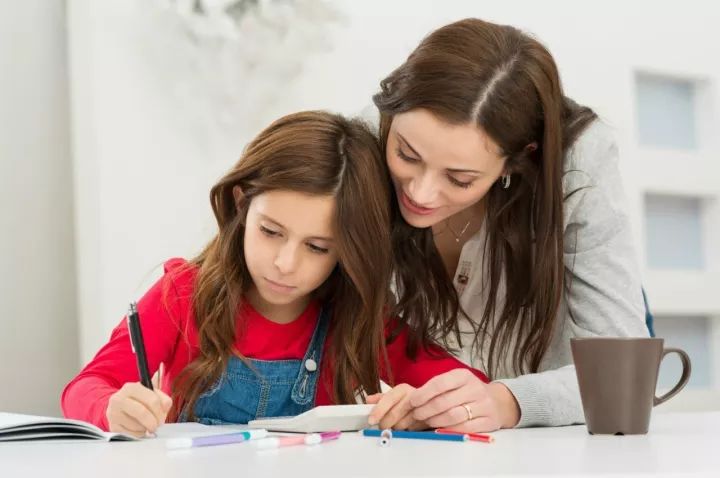
Many parents have various anxiety about their children's life in kindergarten. They worry that their children will cry, they will not sleep, and they will not eat. Many parents are confused about what the child "learns" in the children's garden and what is a reasonable expectation.
In fact, many people do not know that there is a very authoritative "Guide to the Learning and Development of Children Aged 3-6 Years" compiled by the Ministry of Education, which guides children's teaching and life in kindergartens according to the characteristics and laws of children's learning and development.
Studying the Guide, we can know what the kindergarten is "teaching", and it is also possible to learn from children of different ages. What should be known and what can be done, and what level of development can be achieved, so as to follow the scientific laws and encourage growth.
01
What is a healthy posture?
3~4 years old , should be able to sit up straight and stand up under the reminder;
4~5 years old, under the reminder, can maintain the correct station, sit and walk;
5-6 years old, often maintain the correct standing, sitting and walking posture.
special reminder:
It is guaranteed to sleep 11 to 12 hours a day; nap should be about 2 hours, and the time can be gradually reduced as the child ages. The height of the chair is suitable for the feet to be naturally placed, and the thighs are basically horizontal. The height of the table can be straight when writing, not humpback, not shrugging; the bed should not be too soft.
02
What is the stability of the mood?
3~4 years old: The mood is relatively stable, and it is rare to cry because of a little thing; when you are unhappy, you can listen to the advice of adults and calm down more quickly.
4~5 years old: Always maintain a happy mood. If you are not happy, you can ease it quickly. If you need to be satisfied, you can accept the explanation, don't lose your temper. You are willing to tell your neighbors about the emotions, share happiness or seek comfort.
5~6 years old: Always keep a happy mood, know the cause of some negative emotions, can work hard to resolve; the way to express emotions is more moderate, not temper tantrum; can quickly change mood and attention with the needs of activities .
special reminder:
Talk to your child about what you are happy or angry about, and encourage your child to share your emotions with others. Allow children to express their emotions and give appropriate guidance. If the child is not tempered when he loses his temper, wait for him to calm down and tell him what behavior is acceptable.
03
What kind of adaptability is to be achieved?
3~4 years old, able to move in a hot or cold outdoor environment, and can quickly adapt to the collective life with help;
4~5 years old, able to move for half an hour or so in a hot or cold outdoor environment, can adapt quickly to changes in the human environment, such as changing a new teacher can adapt quickly;
5~6 years old, able to continuously move for less than half an hour in a hot or cold outdoor environment, and can quickly integrate into a new interpersonal environment. If you change to a new children's garden or class, you can adapt quickly.
special reminder:
Arrange for children to have no less than two hours of outdoor activities every day, including less than one hour of physical activity.
I often play game activities such as handle loops, swings, swivel chairs, etc., to promote the development of balanced organ function. I often bring my children to a gathering of relatives and friends, support him and other groups of children, so that children can adapt to new relationships.

04
What kind of self-care ability should I achieve?
3~4 years old, under the reminder, you can wash your hands before and after meals; you can wear clothes or shoes and socks with help; you can put toys and books back.
4~5 years old, can wash hands before and after meals, the method is correct; can wear clothes, shoes and socks, button buttons; can organize their own items.
5~6 years old, can increase or decrease clothes according to hot and cold; will tie your own shoes; can organize your own items according to categories.
special reminder:
Regardless of whether the child is doing well or not, he should give appropriate affirmation and not substitute for it because he is not doing well or doing it slowly, so as not to deprive him of the opportunity to develop self-care ability.
The basic methods of teaching children to take care of themselves, such as wearing undressing and footwear, washing their hands, wiping their noses, and wiping their buttocks.
05
What kind of safety and self-protection awareness should I have?
3~4 years old, don't walk with strangers, don't eat things given by strangers; be reminded to pay attention to safety, not to do dangerous things; when you are lost in public places, you can tell your name to the police or related personnel, Home address, parent's name or phone number.
4~5 years old, in public, do not stay away from the sight of adults alone; know common safety signs, can abide by safety rules; actively avoid danger when exercising; know simple help-seeking methods.
5~6 years old, do not open the door to strangers without the permission of adults; can consciously abide by basic safety rules and traffic rules; avoid danger to others during exercise; know some basic disaster prevention knowledge.
special reminder:
Help your child understand unsafe things in the surrounding environment, such as not drinking a kettle, not playing with matches or lighters, not touching power outlets, climbing windows or balconies. Help your child to understand common safety signs such as: electric shock, caution, toxic, swimming under the river, emergency exit, etc. In case of fire or other emergency, know to call 110, 120, 119 and other calls for help.
06
What civilized language habits should be mastered?
3~4 years old, knowing that the eyes are looking at each other when talking to others; speaking naturally, the sound is moderate in size; can use appropriate polite language under the reminder of adults.
4~5 years old, others can respond to their own speech; can adjust the size of their own voice according to the occasion; can actively use polite language, not swearing, swearing.
5~6 years old, can respond positively when others speak; can adjust the tone of speech according to the object and needs of the conversation; know how to rotate in order, not interrupt others; can use the appropriate language according to the situation, such as When others are sad, they will express comfort in the right language.
special reminder:
When the child expresses his opinion, the adult can kneel down, his eyes look at the child, and he listens patiently to the words.
Combine the situation to remind the child of some necessary communication etiquette. If you are polite to your elders, you should say hello when you visit, and say thank you when you get help.

07
What kind of interpersonal skills are you going to achieve?
3~4 years old, like to play with children; like to work with familiar elders.
4~5 years old, like to play with children, have little friends who often play together; like to talk with elders, something to tell elders.
5~6 years old, have their own good friends, and like to make new friends; have questions to ask for advice; have happy or interesting things to share with you.
special reminder:
Encourage your child to contact and talk with others when you are visiting relatives, visiting a friend's house, or having a visit.
Encourage your child to participate in other children's games. He is also welcome to bring his companions to play at home and feel the joy of having friends play together.
08
What self-esteem, self-confidence, and independent performance should be possessed?
3~4 years old, can choose games or other activities according to their own interests; be happy for their good behaviors or activities; do what they can, be willing to do it themselves; like to undertake some small tasks.
4~5 years old, can play games or other activities according to their own ideas; know their own strengths and strengths, feel satisfied with themselves; do their own things as much as possible, do not like to rely on others; dare to try activities and tasks with certain difficulty.
5~6 years old, can take the initiative to initiate activities or come up with ideas in the activities, find ways to do it; do good things or succeed after they want to do better; do their own things, will not be willing to learn; take the initiative to undertake tasks, If you encounter difficulties, you can persist without asking for help; when you are different from others, you dare to stick to your own opinions and give reasons.
special reminder:
Give more recognition and praise, and praise must be targeted and specific. Don't make a simple comparison between the child's shortcomings and the other children's strengths.
Things related to children should be consulted, even if their opinions are different from those of adults, they should listen carefully and accept their reasonable demands.
In the case of ensuring safety, support children to do things according to their own ideas, so that they can establish self-esteem and self-confidence in doing things. Encourage your child to try tasks that are difficult, and pay attention to adjusting the difficulty and let them feel the sense of accomplishment they have worked hard to achieve.
09
How to learn to care for others?
3~4 years old, the elders can listen carefully when they speak, and can listen to the requirements of their elders; when they are sick or unhappy, they express sympathy; under the reminder, they can do not disturb others.
4~5 years old, they will express their demands and thoughts to the elders in a polite manner; they can notice the emotions of others, and they are concerned about the performance of their hearts and thoughtfulness; knowing the profession of their parents, they can understand the hard work of their parents to raise themselves. .
5-6 years old, can pay attention to other people's emotions and needs, and can give help as much as they can; respect those who provide services to everyone, cherish their labor results; accept and respect people who are different from their lifestyle or habits.
special reminder:
Tell the children about their parents' experiences of growing up and let them understand and appreciate the hardships of their parents.
Use shopping, medical treatment and other opportunities to help children understand the social service organizations and their work closely related to themselves, to appreciate the facilities and services provided by these institutions, to respect their labor and to cherish the fruits of labor.
Use folk games, traditional festivals, etc. to help children perceive cultural diversity and diversity, understand that people are equal, and should respect each other and be friendly.

10
How should we follow the basic code of conduct?
3~4 years old, under the reminder, can abide by the rules of games and public places; know that you can't take other people's things without permission, borrow other people's things to return; care for toys and other items.
4~5 years old, feel the meaning of the rules, and can basically abide by the rules; do not take things that are not their own; know that lying is wrong; know that the accepted tasks must be completed; can save food, water and electricity, etc. under the reminder.
5~6 years old, understand the meaning of the rules, can negotiate with the companions to formulate rules of the game and activities; love the public property, know the love when using other people's things; do wrong things, dare to admit, do not lie; can complete their acceptance seriously and responsibly The task; love the environment around you, pay attention to saving resources.
- Classic sleek and comfortable leather Royal Chair available in a variety of colors
- Upholstered in hand picked soft and durable linen fabric in the best colors to match your decor
- This leater royal chair has 2 arm rests, 1 back pillow and a seat cushion both filled with comfortable foam and hypoallergenic polyester fibers
- Minor assembly required. Perfect for lounging while watching your favorite show!
Leather Royal Chair,Leather Tufted Chair,Living Room Chaise Chair,Leather Chaise Lounger Chair
Kaifeng Lanwei Smart Home Co., Ltd , https://www.sofa-recliner.com